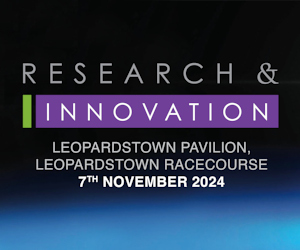CyberColloids: an Irish SME that has made its name as a global centre of excellence for hydrocolloids research and innovation

CyberColloids was set up in 2002 by four founding members with a vision to provide outsourcing of every aspect of the hydrocolloids world. With many years of experience in the global food industry behind them they were familiar with the high overheads associated with corporate research and the growing trend towards more cost effective outsourcing – hence their vision to form the company. Now in 2015, CyberColloids is established as a centre of excellence for polysaccharide and hydrocolloid research and innovation, not only in Europe but on a global basis. We provide R&D services worldwide and are a recognised research provider at an EU level.
CyberColloids is a unique organisation devoted to bringing hydrocolloid innovation to industry through a network of expert associates and companies working together, sharing expertise & resources and delivering cost effective solutions. The company is based in Co. Cork where the main offices and laboratory are situated, there are now 12 people in our team, 10 based in Ireland and 2 in the UK.
Being based Ireland has been a key factor in our success. In recent years, Irish SMEs have benefitted considerably from a national drive to strengthen and support the SME sector. Government agencies e.g. Enterprise Ireland and Local Enterprise Boards have specific frameworks in place and CyberColloids has been fortunate enough to avail of such support. In addition, government agencies and industry alike have worked hard to build Ireland’s international reputation as a food isle and there is strong national drive to maintain this reputation. Food science and technology feature strongly in the teaching and research agendas of Irish HIEs. Our proximity to University College Cork (UCC), Cork Institute of Technology (CIT) and the TEAGASC Dairy Product Research Centre at Moorepark has been an important enabler for CyberColloids. Access to facilities and expertise at these centres allows us to work flexibly to meet all of our R&D demands for production, characterisation and scale up. In addition, the pool of high quality graduates from these centres has enabled us to build our team with local recruits.
What does CyberColloids offer?
CyberColloids’ core business and expertise is in polysaccharide and hydrocolloid chemistry. There are many users of hydrocolloids, practically every food market sector uses hydrocolloids and also many industrial sectors but there are far fewer experts in hydrocolloids and not every user of hydrocolloids can justify the expense of in-house expertise. In addition, all hydrocolloids have different properties and functionalities and it’s not a case of “one hydrocolloid fits all”. With our broad expertise base we offer a complete range of services – from contract research to strategic business development – to help raw material suppliers, processors and users of hydrocolloids to get the most from their hydrocolloids. It’s a successful model that has enabled us to secure a global client base that comprises large multinational food companies to small family enterprises. Please see our website www.cybercolloids.net/services for a more detailed overview of our services.
A little company with big ideas
In 2005 CyberColloids started to look beyond the realms of food texture, realising that hydrocolloids themselves and the biomass from which they are derived had much more to offer – starting with seaweed. Since 2005 we have been looking at seaweed differently, not just as a source of hydrocolloids but as a far more valuable resource for potential use in human nutrition, health and wellbeing. In particular we have investigated the use of seaweed ingredients for naturally healthy foods and functional foods including: low molecular weight fibres and prebiotics for gut health; polyphenols with antioxidant and anti-inflammatory potential and natural flavour compounds for salt replacement.
At the time CyberColloids didn’t have the capability to dedicate a budget or team member to explore the full potential of seaweed. The FUSION programme was offered by InterTrade Ireland as a solution. We were able to recruit a new team member to focus on the research and were partnered with the Northern Ireland Centre for Food and Health (NICHE) at the University of Ulster who brought the expertise in nutrition. This successful partnership launched CyberColloids’ “Seaweeds for Health” research platform. A second FUSION programme followed and crucially for the company, the opportunity to participate in European funded FP7 framework projects. We have now participated in five successful FP7 projects and are just embarking on our first Horizon 2020 project (for more information on these projects, see http://www.cybercolloids.net/services/research-innovation).
Looking forward
The hydrocolloids world in which we operate is changing – as is our thinking. In the past, the production of food ingredients has led to the purposeful extraction, removal, substitution and even throwing away of many nutritional components but with the drive towards “naturalness” and the use of “less processed” food ingredients, we are seeing a change in roles for hydrocolloids and food fibres. Intelligent processing and application of hydrocolloids and food fibres is enabling their use for both texture and nutrition and thus in the formulation of healthier foods. We are now actively engaged in research activities aimed at developing novel processing methodologies and innovative applications for a wide variety of plant derived polysaccharides and other bioactives e.g. polyphenols.
Our thinking also fits well with the global drive towards resource efficiency, we have a particular interest in the valorisation of downstream materials and new or underutilised wholefood biomass resources. With our particular expertise, we can turn our hand to most any polysaccharide rich material that is derived from plants or seaweed. We are currently working on a project to upgrade processing and out-grade waste from the Irish potato and carrot processing industries. Potatoes and carrots are the two largest root crops in Ireland and an estimated 50-60,000 tonnes of waste is generated nationally every year. This represents a significant resource that is being underutilised and one that we can do something with. Other interesting biomass resources that we have worked on include: fruit processing waste (apple, blackcurrant and citrus e.g. grapefruit & orange); vegetable processing waste (celery and beetroot); cereal (oat), seed (flaxseed) and spice extract wastes (chilli and turmeric).
All in all, CyberColloids will continue to support our clients to derive cost effective texture and nutrition and to add value to existing processing practices and we’re keen to participate in future collaborative projects; in particular in the area of developing novel processing methodologies, new ingredients and innovative applications for use in the food and health sectors.







